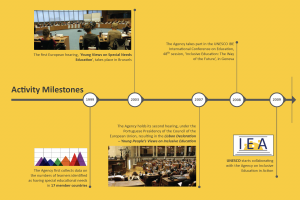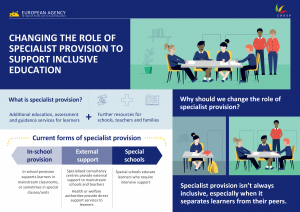This area contains multimedia materials including key messages, presentations and links to videos from the EASNIE YouTube channel.
Infographic: Activity and Operational Milestones

This six-page infographic presents two timelines featured in the Agency publication 'Celebrating 25 years on the path to inclusive education' prepared for the Agency's 25th anniversary.
Infographic: Changing the Role of Specialist Provision to Support Inclusive Education

This two-page infographic illustrates what specialist provision is, why it should support inclusion in mainstream settings and how education policy can drive this change.
The Changing Role of Specialist Provision in Supporting Inclusive Education
Changing the role of specialist provision to support inclusion in mainstream classrooms can benefit teachers, learners and families.
